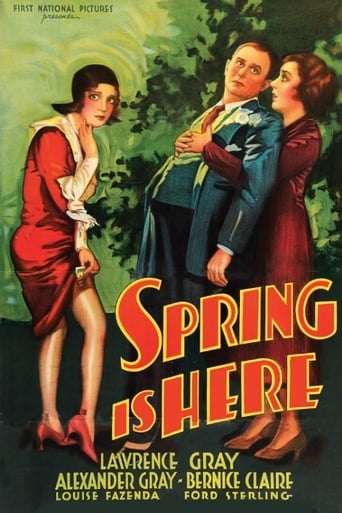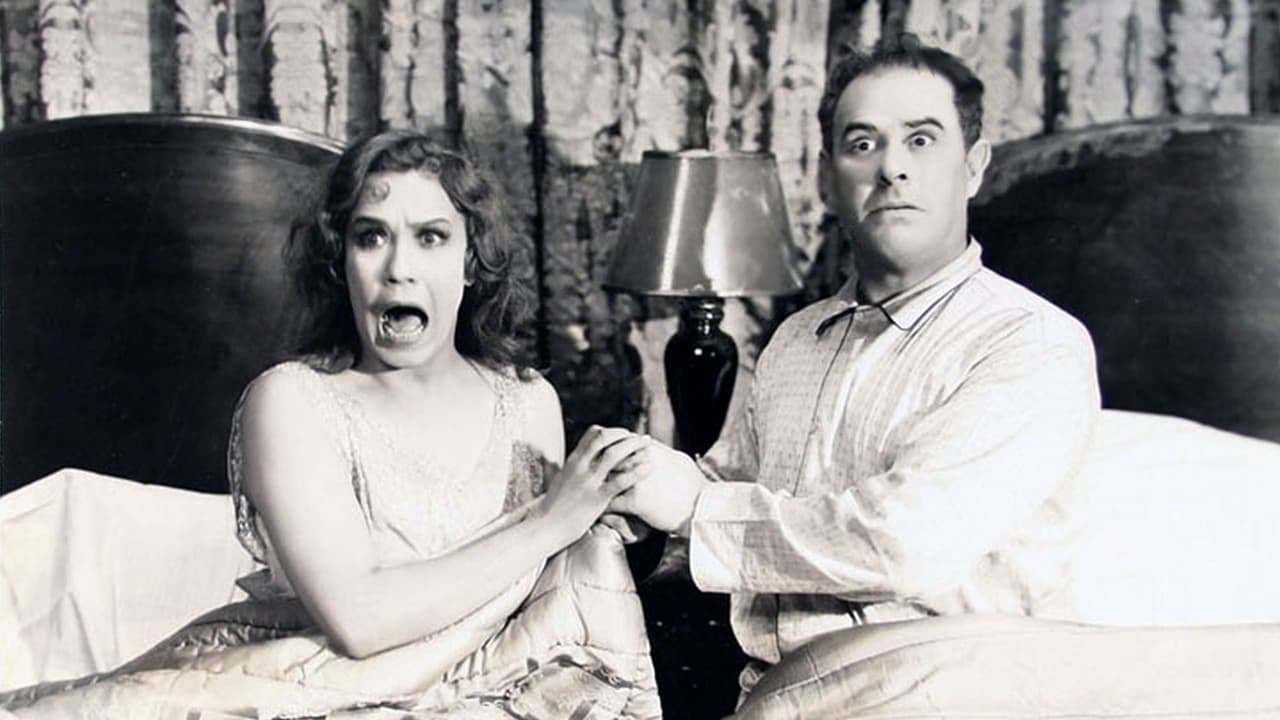lugonian
SPRING IS HERE (First National Pictures, 1930), produced and directed by John Francis Dillon, is a surprisingly entertaining early sound musical comedy taken from the story by Owen Davis Jr., and stage musical by Richard Rodgers and Lorenz Hart, who also composed the songs. Though headed by two Gray actors, Lawrence and Alexander (no relation), the plot very well belongs to the third billed Bernice Claire, a talented young singer in her day with few film credits to her name. Most noted for her screen pairing with Alexander Gray, a baritone singer, in both feature-length (1929-30) and later 20-minute musical short subjects (1934), SPRING IS HERE, their second collaboration, is believed to be their only surviving musical feature film.Opening title: "The Peter Bealey Home on Long Island's fashionable North Shore - a morning in June." The domestic comedy set to song interludes revolves around Betty Bealey (Bernice Claire), a free-spirited young lady whose father, Peter (Ford Sterling), disapproves of her being out all night and sleeping in all day. After returning home at 5 a.m., Peter draws the line of his daughter's carefree activities. Aside from coping with his younger daughter, Mary Jane (Inez Courtney), and her courtship with Stacey Hayden (Frank Albertson), along with his ditsy but squeaky speaking wife, Emily (Louise Fazenda), Peter disapproves of Betty's latest beau, Steve Alden (Lawrence Gray), whom she's only known a short time. Hoping she'd settle down and get married, Peter tries his best to encourage Betty into marrying Terry Clayton (Alexander Gray), a clumsy but shy young man with some sense, unaware that Steve who comes from a wealthy family.Through its brief 68 minutes, SPRING IS HERE contains enough songs for a 90 minute feature, including that of: "Spring is Here" (sung by Frank Albertson and Inez Courtney); "Yours Sincerely" (sung by Alexander Gray and Bernice Claire); "Bad Baby" (sung by Inez Courtney); "Crying for the Carolines" (sung by The Brox Sisters during party sequence); "With a Song in My Heart" (sung by Lawrence Gray and Bernice Claire); "Having a Little Faith in Me" (sung by Alexander Gray); "How Shall I Tell?" (sung by Bernice Claire/ written by Sam Lewis, Joe Young and Harry Warren); "What's the Big Idea?" (sung by Inez Courtney and Frank Albertson); and "With a Song in My Heart" (sung by Gray and Claire). Of the selection of songs, many which are quite good if not everlasting to memory. Only "With a Song in My Heart" is the most familiar, considering how it's been immortalized in the musical biography, WITH A SONG IN MY HEART (20th Century-Fox, 1952) starring Susan Hayward as famed singer, Jane Froman.While the other Gray-Claire screen collaborations of NO, NO NANETTE (1929) and SONG OF THE FLAME (1930) have been lost to revivals, SPRING IS HERE, survived intact, giving film buffs some basic idea of their work and on-screen chemistry. Other than noting how Claire wears two different hairstyles at once (hair covering the left side of her face and hair combed back on her right side, exposing both face and ear), it's also easy for anyone who missed seeing Claire's name in the opening credits, to somehow mistake her for a youthful, dark-haired Penny Singleton (then performing under her real name of Dorothy McNulty), the same Singleton years before her acclaim in the long-running "Blondie" movie series (1938-1950) for Columbia. Claire also quotes one interesting line worth noting, "A woman is as strong as her weakest moment." As for Alexander Gray, it's worth mentioning how his talking manner and singing differ, from mildly speaking to rich baritone voice. It's a wonder how much further the careers of Gray and Claire might have gone had musicals not fallen out of favor for public acceptance by the end of 1930.Aside from some surprisingly risqué dialog and funny nifty comebacks during moments of comedy, there's also some very amusing scenes provided by the frustrated Ford Sterling and scatterbrained Louise Fazenda, former comics of silent comedy shorts whose characters here seem to precede that of Archie and Edith Bunker from the classic "All in the Family" TV series of the seventies. There's also Inez Courtney giving a sassy performance for comedy relief so reminiscent to the then notable Warner Brothers comedienne of Winnie Lightner. Other members of the cast include Natalie Moorehead as Rita Conway, and Gretchen Thomas as Maude, among others.SPRING IS HERE, while no masterpiece, gets by on both comedy and sometimes corny musical interludes. Let's not overlook the legendary "With a Song in My Heart" (which is scored during the opening credits) which highlights the film. Regardless of its age, this musical antique is a worthy rediscovery and something to consider whenever it turns up on the Turner Classic Movies cable channel. Spring is here. (**1/2)
tedg
Most of the movies from this period are bad, stabs in the eye. But you have to watch your quota in order to register the form.These early ones are pretty fascinating because with the onset of sound, filmmakers veered away from story for a while and accommodated the stage show. This is an early musical following the pattern used on Broadway, set by opera centuries before and still somewhat followed. Its song stitched together in the slightest of ways.The songs here seemed dreadful to me, absolutely dreadful. Just changing tastes on which drek we tolerate, I suppose.The story is about a girl, and someone who loves her, and her confusion over him and another boy. Which is less boring is the question. She and all the supposed sexy girls here have that mannish, short hairdo that was popular for only a couple years, invented by film.There's a blustery father whose job it is to keep things moving. The origin of his role is belied in the middle of the movie when in the midst of his patter he says of a joke: "I just tell em, I don't explain em." Everything else about this is from the stage as well, a strange deviation for cinema as it tried to discover what it would be. Its precode, so while there is nothing overtly sexy is shown, its clear that there are sex acts all around the story.Ted's Evaluation -- 1 of 3: You can find something better to do with this part of your life.
movingpicturegal
Early musical about fickle Betty of the Long Island "fashionable set", the kind who seem to mostly go around with tennis rackets and ukuleles gripped in their hands. She stays out 'til five in the morning "riding" with a new fellow (leaving her regular beau high and dry at the dance) - so her grump of a dad decides he needs to put a stop to that kind of stuff and "get her a good husband". Well, when the regular fellow, Terry, shows up next morning, dad practically proposes himself - but Betty won't marry Terry. Terry IS in love, so - given the push by Betty's little 16-year-old sister (who looked to me about 35), he decides to spark Betty's jealousy by flirting with other women. And boy does he - including giving a passionate kiss to Betty's mom!This film is pretty silly, though has moments - such as the dad spouts a number of pretty good one-liners and there is a little bit of pre-code naughtiness too. The whole film comes across as a little stiff and stage play like - it includes characters bursting into song here and there, most of which are fairly mediocre, though I thought a few of the numbers were kind of catchy. The lead actors in this are not very memorable (though, at least, they sing well) - the most interesting characters are actually the girl's parents, quite amusingly portrayed by Ford Sterling and Louise Fazenda - the mom is depicted as very dizzy (reminded me of Gracie Allen). Betty turns into a "yes dear" baby talker kind of gal in the end, oh well. Fun, light entertainment.
fwmurnau
Caught this today on TCM. It's one of those run-of-the-mill early sound-era musicals that soured the public on singing films until the exciting 42ND STREET and the early Busby Berkeley extravaganzas pumped juice back into the musical genre.Fazenda and her co-stars sing well in the operetta style that was still popular at this time, but their acting tends to be as stiff, stagy and clichéd as the story, dialog, and camera-work.It's interesting to see the kind of brainless and virtually heartless musical comedy that was current when SHOW BOAT debuted on Broadway and then on film, pointing the way toward more heartfelt, substantial musicals in the future. Tastes in comedy change, but I doubt anyone found this one very funny even when it first appeared. The humor is really forced and lame.The story is an ancestor of the teen comedies that would be popular decades later: a young jazz baby can't decide between two suitors, while her cranky, "old-fashioned" father and clueless mother provide comic relief.Hit with a bunch of stagy, static movies like this one, no wonder the public at the time got sick of musicals. The genre had to be reconceived a couple years later, turned into a faster, fresher, more kinetic entertainment that was truly cinematic.SPRING IS HERE is a typical plodding commercial product of its era. It's competent without being in any way outstanding. It will interest specialists as an example of writing and performing styles of the 1920s, but it won't win any new converts to early sound-era musicals. It's pretty bad ...


 AD
AD
